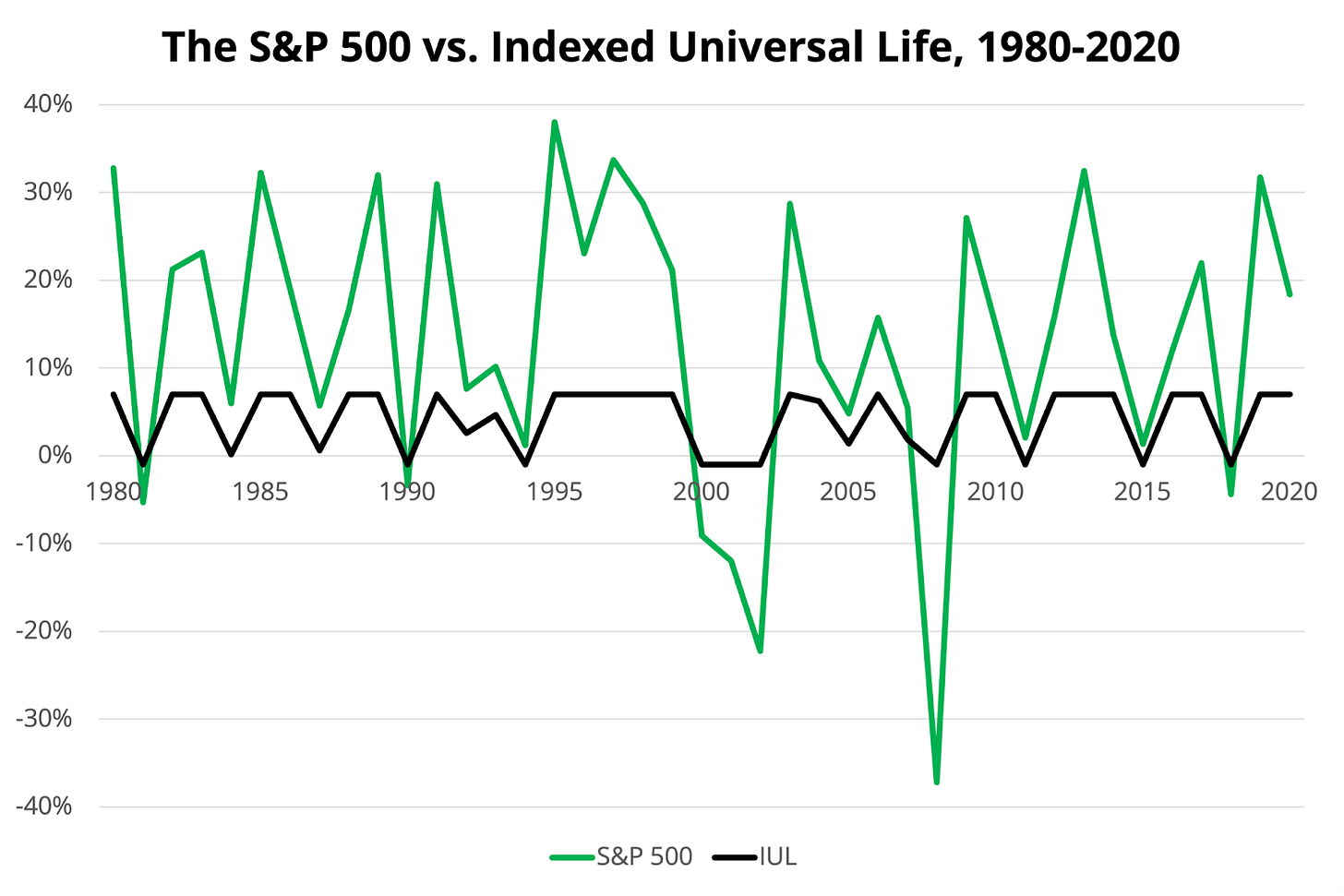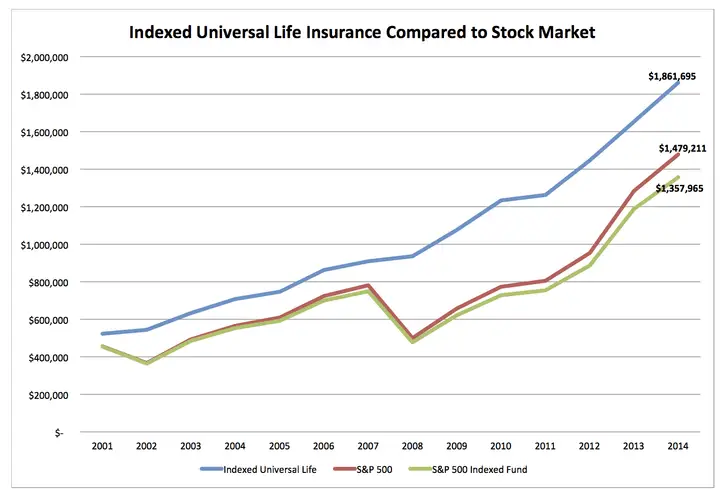All Categories
Featured
Table of Contents
In exchange for gaining a restricted amount of the index's development, the IUL will certainly never get less than 0 percent interest. Even if the S&P 500 decreases 20 percent from one year to the next, your IUL will certainly not lose any money value as an outcome of the market's losses.

Think of the rate of interest compounding on an item with that kind of power. Provided all of this info, isn't it imaginable that indexed universal life is an item that would certainly allow Americans to purchase term and spend the rest?
A true investment is a securities item that goes through market losses. You are never ever subject to market losses with IUL merely because you are never based on market gains either. With IUL, you are not spent in the marketplace, but merely gaining rate of interest based on the efficiency of the marketplace.
Returns can expand as long as you proceed to make repayments or maintain an equilibrium.
Columbus Life Iul
Unlike global life insurance policy, indexed universal life insurance policy's money worth gains rate of interest based upon the performance of indexed securities market and bonds, such as S&P and Nasdaq. It isn't directly invested in the supply market. Mark Williams, CEO of Brokers International, states an indexed universal life policy is like an indexed annuity that really feels like universal life.

Due to these attributes, permanent life insurance policy can operate as an investment and wealth-building tool. Universal life insurance policy was created in the 1980s when rate of interest were high. Like other sorts of long-term life insurance policy, this policy has a cash worth. Universal life's cash worth gains interest based upon present money market prices, yet rate of interest vary with the market.
Indexed universal life plans supply a minimal guaranteed passion rate, additionally known as a rate of interest attributing flooring, which minimizes market losses. State your cash worth sheds 8%.
Equity Indexed Universal
It's also best for those happy to presume added danger for higher returns. A IUL is an irreversible life insurance policy plan that obtains from the residential or commercial properties of an universal life insurance plan. Like universal life, it allows adaptability in your survivor benefit and premium settlements. Unlike global life, your cash worth grows based on the performance of market indexes such as the S&P 500 or Nasdaq.
Her work has actually been released in AARP, CNN Underscored, Forbes, Fortune, PolicyGenius, and United State News & Globe Record. ExperienceAlani has actually evaluated life insurance coverage and family pet insurer and has created many explainers on travel insurance coverage, credit scores, financial obligation, and home insurance coverage. She is enthusiastic concerning demystifying the intricacies of insurance and other personal finance topics to make sure that readers have the information they need to make the most effective cash choices.

Paying just the Age 90 No-Lapse Premiums will certainly guarantee the death advantage to the insured's attained age 90 but will not assure cash worth build-up. If your customer terminates paying the no-lapse guarantee costs, the no-lapse feature will certainly terminate before the assured period. If this happens, added premiums in a quantity equivalent to the deficiency can be paid to bring the no-lapse function back effective.
I lately had a life insurance policy salesperson turn up in the remarks thread of an article I released years ago regarding not blending insurance policy and investing. He thought Indexed Universal Life Insurance Coverage (IUL) was the finest point because sliced bread. In support of his placement, he uploaded a web link to a short article created in 2012 by Insurance Agent Allen Koreis in 2012, entitled "16 Reasons Accountants Prefer Indexed Universal Life Insurance Coverage" [web link no longer offered]
Best Variable Life Insurance
First a brief description of Indexed Universal Life Insurance Policy. The tourist attraction of IUL is noticeable. The facility is that you (nearly) get the returns of the equity market, with no danger of losing cash. Currently, before you diminish your chair poking fun at the absurdity of that declaration, you need to understand they make an extremely persuading disagreement, at least up until you check out the details and understand you don't get anywhere near the returns of the equity market, and you're paying much way too much for the warranties you're obtaining.
:max_bytes(150000):strip_icc()/dotdash-comparing-iul-insurance-iras-and-401ks-Final-71f14693e37d4fb1b0736112179802b5.jpg)
If the market goes down, you get the ensured return, generally something between 0 and 3%. Obviously, considering that it's an insurance policy, there are additionally the normal costs of insurance coverage, commissions, and surrender charges to pay. The details, and the factors that returns are so dreadful when blending insurance coverage and investing in this specific way, boil down to basically three things: They just pay you for the return of the index, and not the returns.
Iul For Retirement Income
If you cap is 10%, and the return of the S&P 500 index fund is 30% (like last year), you obtain 10%, not 30%. If the Index Fund goes up 12%, and 2% of that is rewards, the change in the index is 10%.
Include all these impacts together, and you'll find that long-term returns on index global life are pretty darn close to those for entire life insurance policy, positive, however low. Yes, these plans ensure that the cash value (not the money that mosts likely to the costs of insurance policy, obviously) will certainly not shed cash, however there is no guarantee it will stay on par with inflation, a lot less grow at the rate you need it to expand at in order to attend to your retired life.
Koreis's 16 factors: An indexed universal life plan account value can never ever shed cash due to a down market. Indexed global life insurance policy warranties your account value, locking in gains from each year, called a yearly reset. That holds true, yet only in small returns. Ask on your own what you need to pay in order to have an assurance of no nominal losses.
In investing, you earn money to take threat. If you do not desire to take much danger, don't expect high returns. IUL account worths grow tax-deferred like a certified strategy (IRA and 401(k)); common funds don't unless they are held within a qualified plan. Basically, this indicates that your account worth take advantage of three-way compounding: You earn rate of interest on your principal, you gain passion on your interest and you gain interest on the money you would or else have paid in tax obligations on the passion.
Group Universal Life Insurance Pros And Cons
Certified plans are a better choice than non-qualified strategies, they still have problems not present with an IUL. Investment choices are generally limited to common funds where your account value is subjected to wild volatility from exposure to market danger. There is a huge distinction between a tax-deferred retired life account and an IUL, however Mr.
You purchase one with pre-tax dollars, reducing this year's tax obligation costs at your marginal tax rate (and will commonly be able to withdraw your cash at a lower efficient price later on) while you purchase the other with after-tax bucks and will certainly be compelled to pay interest to obtain your very own money if you don't intend to give up the policy.
He throws in the traditional IUL salesman scare tactic of "wild volatility." If you dislike volatility, there are far better methods to lower it than by getting an IUL, like diversity, bonds or low-beta supplies. There are no limitations on the amount that might be contributed each year to an IUL.

Why would certainly the federal government put limitations on how much you can put into retired life accounts? Perhaps, simply possibly, it's due to the fact that they're such a wonderful bargain that the government does not want you to save too much on tax obligations.
Latest Posts
Iul As A Retirement Vehicle
Why Indexed Universal Life Insurance Might Be New 401k
Equity Index Life